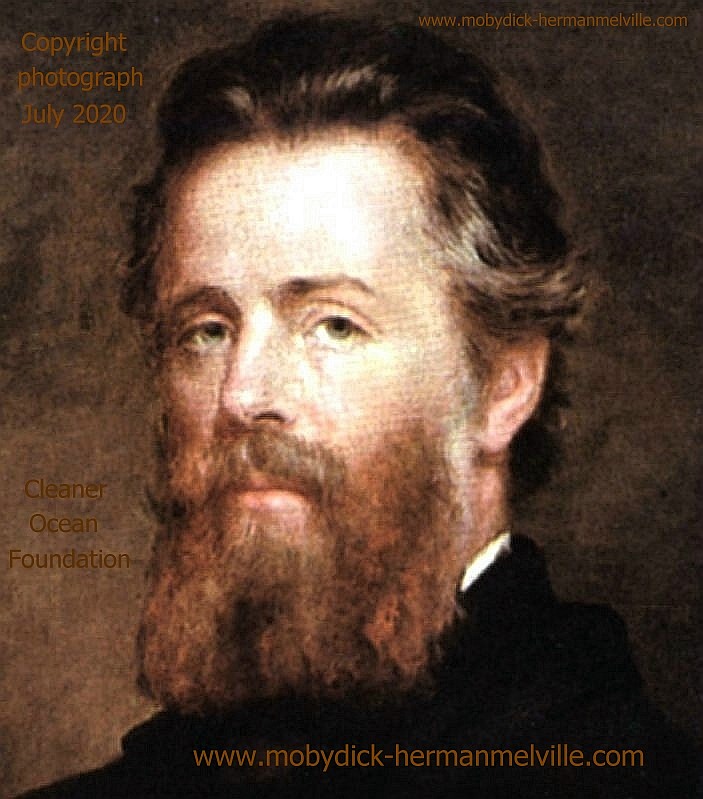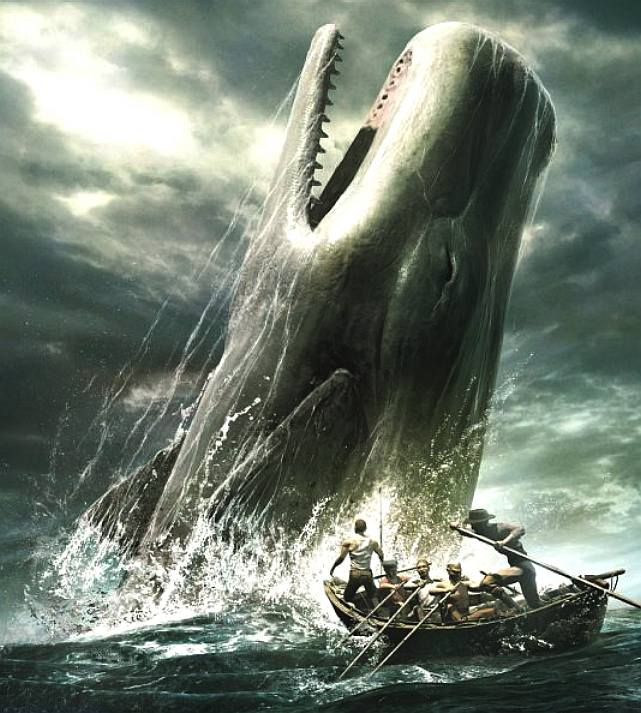|
Chapter 26 - KNIGHTS & SQUIRES
Please use our A-Z INDEX to navigate this site
|
Herman Melville was the author of a story about what we'd now consider an illegal activity, the commercial hunting of whales for oil and meat. Whaling is still carried out by Japan, Iceland and Canada, among other nations, though most nations voluntarily abstain in the interests of conserving these magnificent animals - as per International Whaling Commission guidelines.
Back <<<
CHAPTER 26. Knights and Squires.
The chief mate of the Pequod was Starbuck, a native of Nantucket, and a Quaker by descent. He was a long, earnest man, and though born on an icy coast, seemed well adapted to endure hot latitudes, his flesh being hard as twice-baked biscuit. Transported to the Indies, his live blood would not spoil like bottled ale. He must have been born in some time of general drought and famine, or upon one of those fast days for which his state is famous. Only some thirty arid summers had he seen; those summers had dried up all his physical superfluousness. But this, his thinness, so to speak, seemed no more the token of wasting anxieties and cares, than it seemed the indication of any bodily blight. It was merely the condensation of the man. He was by no means ill-looking; quite the contrary. His pure tight skin was an excellent fit; and closely wrapped up in it, and embalmed with inner health and strength, like a revivified Egyptian, this Starbuck seemed prepared to endure for long ages to come, and to endure always, as now; for be it Polar snow or torrid sun, like a patent chronometer, his interior vitality was warranted to do well in all climates.
Looking into his eyes, you seemed to see there the yet lingering images of those thousand-fold perils he had calmly confronted through life. A staid, steadfast man, whose life for the most part was a telling pantomime of action, and not a tame chapter of sounds. Yet, for all his hardy sobriety and fortitude, there were certain qualities in him which at times affected, and in some cases seemed well nigh to overbalance all the rest. Uncommonly conscientious for a seaman, and endued with a deep natural reverence, the wild watery loneliness of his life did therefore strongly incline him to superstition; but to that sort of superstition, which in some organizations seems rather to spring, somehow, from intelligence than from ignorance. Outward portents and inward presentiments were his. And if at times these things bent the welded iron of his soul, much more did his far-away domestic memories of his young Cape wife and child, tend to bend him still more from the original ruggedness of his nature, and open him still further to those latent influences which, in some honest-hearted men, restrain the gush of dare-devil daring, so often evinced by others in the more perilous vicissitudes of the fishery. "I will have no man in my boat," said Starbuck, "who is not afraid of a whale." By this, he seemed to mean, not only that the most reliable and useful courage was that which arises from the fair estimation of the encountered peril, but that an utterly fearless man is a far more dangerous comrade than a coward.
Next >>>
BOOK CHAPTERS CHAPTER 26. Knights and Squires. CHAPTER 27. Knights and Squires. CHAPTER 29. Enter Ahab; to Him, Stubb. CHAPTER 39. First Night Watch. CHAPTER 40. Midnight, Forecastle. CHAPTER 42. The Whiteness of The Whale. CHAPTER 48. The First Lowering. CHAPTER 50. Ahab's Boat and Crew. Fedallah. CHAPTER 54. The Town-Ho's Story. CHAPTER 55. Of the Monstrous Pictures of Whales. CHAPTER 56. Of the Less Erroneous Pictures of Whales, and the True CHAPTER 57. Of Whales in Paint; in Teeth; in Wood; in Sheet-Iron; in CHAPTER 61. Stubb Kills a Whale. CHAPTER 65. The Whale as a Dish. CHAPTER 66. The Shark Massacre. CHAPTER 71. The Jeroboam's Story. CHAPTER 73. Stubb and Flask Kill a Right Whale; and Then Have a Talk CHAPTER 74. The Sperm Whale's Head—Contrasted View. CHAPTER 75. The Right Whale's Head—Contrasted View. CHAPTER 76. The Battering-Ram. CHAPTER 77. The Great Heidelburgh Tun. CHAPTER 78. Cistern and Buckets. CHAPTER 81. The Pequod Meets The Virgin. CHAPTER 82. The Honour and Glory of Whaling. CHAPTER 83. Jonah Historically Regarded. CHAPTER 88. Schools and Schoolmasters. CHAPTER 89. Fast-Fish and Loose-Fish. CHAPTER 91. The Pequod Meets The Rose-Bud. CHAPTER 94. A Squeeze of the Hand. CHAPTER 98. Stowing Down and Clearing Up. CHAPTER 102. A Bower in the Arsacides. CHAPTER 103. Measurement of The Whale's Skeleton. CHAPTER 104. The Fossil Whale. CHAPTER 105. Does the Whale's Magnitude Diminish?—Will He Perish? CHAPTER 108. Ahab and the Carpenter. CHAPTER 109. Ahab and Starbuck in the Cabin. CHAPTER 110. Queequeg in His Coffin. CHAPTER 115. The Pequod Meets The Bachelor. CHAPTER 120. The Deck Towards the End of the First Night Watch. CHAPTER 121. Midnight.—The Forecastle Bulwarks. CHAPTER 122. Midnight Aloft.—Thunder and Lightning. CHAPTER 125. The Log and Line. CHAPTER 128. The Pequod Meets The Rachel. CHAPTER 131. The Pequod Meets The Delight. CHAPTER 133. The Chase—First Day. CHAPTER 134. The Chase—Second Day. CHAPTER 135. The Chase.—Third Day.
Moby Dick is the antogonist in this story of a great white 'bull' sperm whale that fought back at whalers who tried to harpoon him.
The idea came to Herman Melville after he spent time on a commercial whaler, where stories abounded of the sinking of the Essex in 1821 and Mocha Dick, a giant sperm whale that sank around 20 ships, before being harpooned in 1838.
Herman realised how fixated the sailors became, and he also became with the thought that there was a whale that nobody could catch, that represented a real risk to the whalers hunting whales, in that it was more sport than commercial operations.
Without any doubt this is one of the greatest novels coming out of America at this time and way off the beaten track, making it so interesting, reflecting the state of whaling and the economic importance in the developing the nation - giving the general public a taste of something adventurous that most people never think about.
Many films and graphic novel adaptations have been inspired by the writings of Herman Melville, from Marvel and Disney comics with good cause.
One such production in 2020 is a graphic novel about a giant humpback whale called Kulo Luna, that sinks a modern whaling boat, much as depicted in Herman Melville's Moby Dick, except that is this day and age whales have explosive harpoons to contend with, and sonar, from which there is no escape.
Please use our A-Z INDEX to navigate this site
|
|
This website is Copyright © 2020 Cleaner Ocean Foundation Ltd and Jameson Hunter Ltd
|

